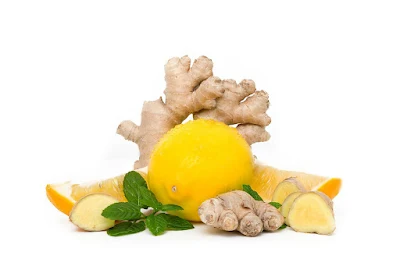Hello friends, today we have brought you one such Vegetable from the treasure of Vegetables, by consuming which you can cure many diseases of your body.
Organic Ginger Benefits
A vegetable that is rich in antioxidants, which has the ability to fight diseases and can provide you with a healthy life. Therefore, all of you will be happy to know that the name of that vegetable is Ginger.
Let us know that what are the qualities inside this fruit, by consuming which many diseases of our body are cured.
Let us know that what are the qualities inside this fruit, by consuming which many diseases of our body are cured.
Ginger has many potential health benefits, including:
Digestive system: Ginger may help with nausea, vomiting, and digestion.
Inflammation: Ginger may have anti-inflammatory properties and may help with arthritis.
 |
| image credit goes to freepik |
Pain: Ginger may relieve pain when applied topically.
Infections: Ginger may help fight off infections.
Cholesterol: Ginger may lower cholesterol levels.
Cancer: Ginger may reduce the risk of cancer.
Chronic diseases: Ginger may help fight off chronic diseases like high blood pressure, heart disease, and lung disease.
Ginger is also high in antioxidants, which may help prevent stress and damage to DNA. Ginger can be consumed in many forms, including: Dried root, Pickled ginger, Ginger tea, Ginger shots.
However, ginger may inhibit blood clotting, which may increase the risk of bleeding. People taking blood sugar-lowering medications should speak with their healthcare provider before taking ginger.
What can happen if you eat ginger everyday?
Ginger is generally safe to eat daily. However, eating more than 6 grams of ginger per day can cause gastrointestinal issues like diarrhea, heartburn, and reflux. Pregnant women should limit their ginger intake to 1 gram per day.
Some potential side effects of eating too much ginger include:
 |
| image credit goes to freepik |
Stomach irritation: Ginger can cause the stomach to produce more acid.
Skin and eye allergic reactions: Too much ginger can cause allergic reactions, including rashes.
Who should not take ginger?
This is for informational purposes only. This information does not constitute medical advice or diagnosis. A doctor or other medical professional is best able to help you find the information and care you need.
People with the following conditions should not take ginger without consulting their doctor:
- Pregnant or breastfeeding women
- Heart conditions
- Diabetes
- Bleeding disorders
- Gallstones
- About to have surgery
How do you take ginger daily?
This is for informational purposes only. This information does not constitute medical advice or diagnosis. A doctor or other medical professional is best able to help you find the information and care you need.
Here are some ways to take ginger daily:
- Ginger tea: Can help with headaches and nausea
- Ginger water: Can help with bad breath and bacterial infections
- Ginger capsules: Can help with digestion
- Ginger juice: Can be added to smoothies, mocktails, or elixirs
- Ginger powder: Can help with digestion
You can also try eating fresh ginger before meals.
 |
| image credit goes to pixabay |
Ginger Reduces Migraine Pain
A medical expert, like a doctor, is best able to help you find the information and care you need. This information does not constitute medical advice or diagnosis.
Ginger has been recommended as a home remedy for migraines. It can help with both headache pain and nausea. A meta-analysis found that ginger is safe and effective for treating migraine pain.
To use ginger for migraines, you can mix 1/8–1/4 teaspoon of powdered ginger into a cup of water. You can also try stirring half a teaspoon of ground ginger into a glass of water. You can repeat the dose after two hours if needed.
Other remedies for migraines include:
- Using a cold pack
- Turning down the lights
- Identifying triggers
- Taking medication
- Hydrating
- Consuming caffeine
- Trying temperature therapy
Ginger Prevent From Nausea
Ginger is an ancient herb that's often used to treat nausea and vomiting. It's also used to treat motion sickness and hangovers. Ginger is thought to work by increasing the movement of the GI tract.
 |
| image credit goes to pixabay |
Some studies have found that ginger may be as effective as some anti-nausea medications with fewer side effects. A typical dose of ginger for nausea is 1,000 milligrams.
Other things that may help with nausea include:
- Getting fresh air
- Distracting yourself
- Sipping a cold drink
- Drinking ginger or peppermint tea
- Eating foods containing ginger
- Eating smaller, more frequent meals
Note: This is for informational purposes only. This information does not constitute medical advice or diagnosis.
Comments
Post a Comment